东西方文化差异(英文)
- 格式:ppt
- 大小:6.78 MB
- 文档页数:40
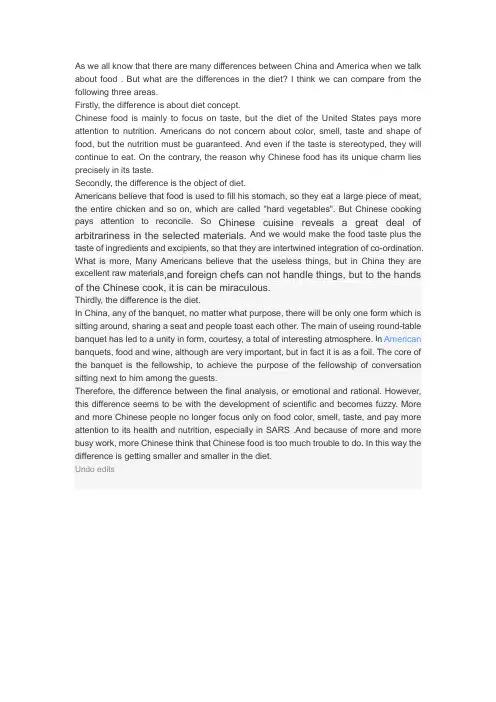
As we all know that there are many differences between China and America when we talk about food . But what are the differences in the diet? I think we can compare from the following three areas.Firstly, the difference is about diet concept.Chinese food is mainly to focus on taste, but the diet of the United States pays more attention to nutrition. Americans do not concern about color, smell, taste and shape of food, but the nutrition must be guaranteed. And even if the taste is stereotyped, they will continue to eat. On the contrary, the reason why Chinese food has its unique charm lies precisely in its taste.Secondly, the difference is the object of diet.Americans believe that food is used to fill his stomach, so they eat a large piece of meat, the entire chicken and so on, which are called "hard vegetables". But Chinese cooking pays attention to reconcile. So Chinese cuisine reveals a great deal of arbitrariness in the selected materials. And we would make the food taste plus the taste of ingredients and excipients, so that they are intertwined integration of co-ordination. What is more, Many Americans believe that the useless things, but in China they are excellent raw materials,and foreign chefs can not handle things, but to the hands of the Chinese cook, it is can be miraculous.Thirdly, the difference is the diet.In China, any of the banquet, no matter what purpose, there will be only one form which is sitting around, sharing a seat and people toast each other. The main of useing round-table banquet has led to a unity in form, courtesy, a total of interesting atmosphere. I n American banquets, food and wine, although are very important, but in fact it is as a foil. The core of the banquet is the fellowship, to achieve the purpose of the fellowship of conversation sitting next to him among the guests.Therefore, the difference between the final analysis, or emotional and rational. However, this difference seems to be with the development of scientific and becomes fuzzy. More and more Chinese people no longer focus only on food color, smell, taste, and pay more attention to its health and nutrition, especially in SARS .And because of more and more busy work, more Chinese think that Chinese food is too much trouble to do. In this way the difference is getting smaller and smaller in the diet.Undo edits。
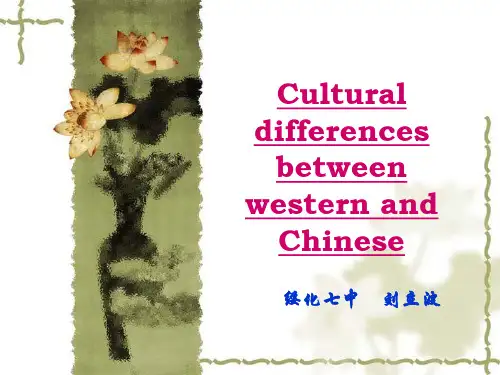
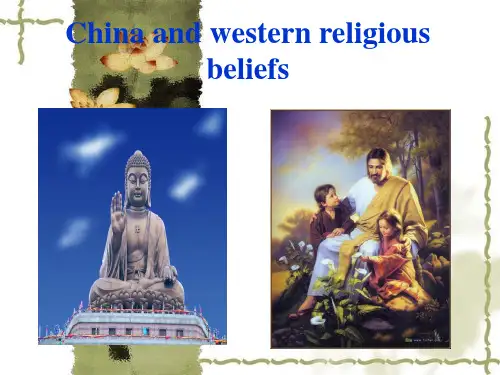
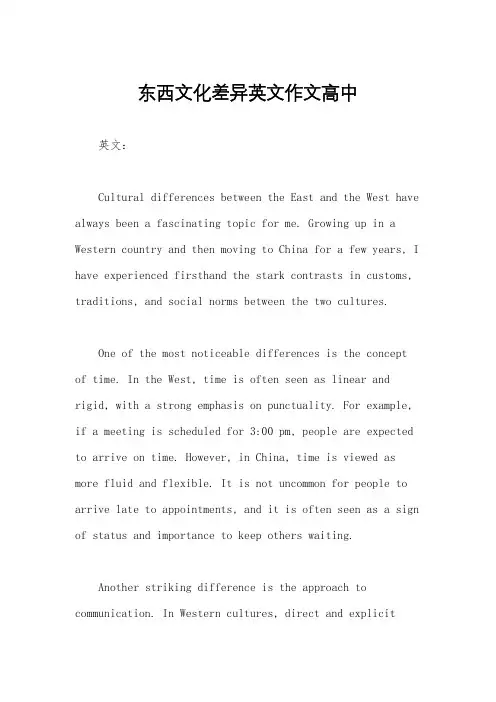
东西文化差异英文作文高中英文:Cultural differences between the East and the West have always been a fascinating topic for me. Growing up in a Western country and then moving to China for a few years, I have experienced firsthand the stark contrasts in customs, traditions, and social norms between the two cultures.One of the most noticeable differences is the concept of time. In the West, time is often seen as linear and rigid, with a strong emphasis on punctuality. For example, if a meeting is scheduled for 3:00 pm, people are expected to arrive on time. However, in China, time is viewed as more fluid and flexible. It is not uncommon for people to arrive late to appointments, and it is often seen as a sign of status and importance to keep others waiting.Another striking difference is the approach to communication. In Western cultures, direct and explicitcommunication is valued, and people are encouraged to speak their minds openly. On the other hand, in Chinese culture, there is a greater emphasis on indirect communication and saving face. For example, instead of saying "no" outright, a Chinese person might use vague language to convey the same message in order to avoid causing embarrassment or offense.Furthermore, the concept of individualism versus collectivism is a significant cultural contrast. In the West, individualism is highly valued, and people are encouraged to express their unique identities and pursue personal goals. In contrast, Chinese culture places a strong emphasis on collectivism, with an emphasis on harmony within the group and fulfilling societal expectations.In addition, the perception of hierarchy and authority differs greatly between the two cultures. In the West, there is a more egalitarian approach to authority, with an emphasis on questioning and challenging those in power. In China, there is a deep respect for hierarchy, and it iscommon for people to defer to those in positions ofauthority without question.Overall, these cultural differences have shaped my understanding of the world and have enriched my experiences. By embracing and appreciating the unique aspects of each culture, I have gained a broader perspective and a deeper appreciation for diversity.中文:东西方文化差异一直是我感到非常有趣的话题。
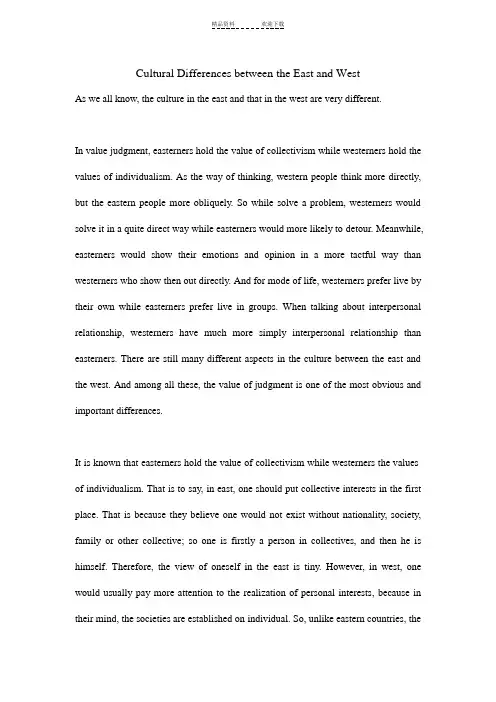
Cultural Differences between the East and WestAs we all know, the culture in the east and that in the west are very different.In value judgment, easterners hold the value of collectivism while westerners hold the values of individualism. As the way of thinking, western people think more directly, but the eastern people more obliquely. So while solve a problem, westerners would solve it in a quite direct way while easterners would more likely to detour. Meanwhile, easterners would show their emotions and opinion in a more tactful way than westerners who show then out directly. And for mode of life, westerners prefer live by their own while easterners prefer live in groups. When talking about interpersonal relationship, westerners have much more simply interpersonal relationship than easterners. There are still many different aspects in the culture between the east and the west. And among all these, the value of judgment is one of the most obvious and important differences.It is known that easterners hold the value of collectivism while westerners the values of individualism. That is to say, in east, one should put collective interests in the first place. That is because they believe one would not exist without nationality, society, family or other collective; so one is firstly a person in collectives, and then he is himself. Therefore, the view of oneself in the east is tiny. However, in west, one would usually pay more attention to the realization of personal interests, because in their mind, the societies are established on individual. So, unlike eastern countries, theview of self is great in western countries.In the past years, millions of people argue that the collectivism and individualism which one is better. They all had their own points, and as for me, they are all reasonable. In one hand, any one of us is living in the collective, on one can live without collective; and as a member of a collective, it is reasonable and necessary to attach importance to the congregate interests. But it does not necessary mean that we should give up all our rational interests, we still have the rights to pursue them. Only when our own interest against the congregate one, should we put the congregate one in the first place. In the other hand, it is right for the individualism stress the expression of individuality, independence, liberty, competition, and self-achievement.A society should admit individual value, so that, the whole society could exert its vitality absolutely. In a word, from my point of view, these two types of value are all meaningful and have their own pros.There are many differences between east and west. Different cultures add a colorful element to the world. The cultural gap should not be the obstacle to the civilization of human being. It ought to be the motivation of our going farther. Besides, we can not judge which type of culture is better in our own point of view, because all culture exits in its meaningful way: they formed, developed and exited in a specific culture and social environment.。
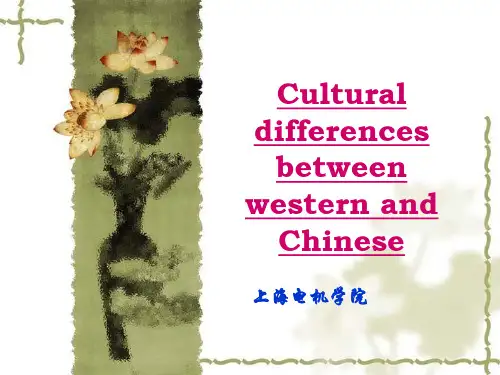
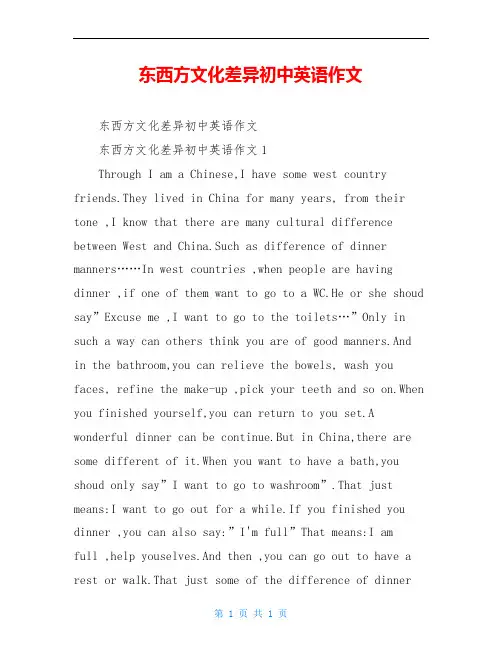
东西方文化差异初中英语作文东西方文化差异初中英语作文东西方文化差异初中英语作文1Through I am a Chinese,I have some west country friends.They lived in China for many years, from their tone ,I know that there are many cultural difference between West and China.Such as difference of dinnermann ers……In west countries ,when people are having dinner ,if one of them want to go to a WC.He or she shoud say”Excuse me ,I want to go to the toilets…”Only in such a way can others think you are of good manners.Andin the bathroom,you can relieve the bowels, wash you faces, refine the make-up ,pick your teeth and so on.When you finished yourself,you can return to you set.A wonderful dinner can be continue.But in China,there are some different of it.When you want to have a bath,you shoud only say”I want to go to washroom”.That just means:I want to go out for a while.If you finished you dinner ,you can also say:”I'm full”That means:I amfull ,help youselves.And then ,you can go out to have a rest or walk.That just some of the difference of dinnermanners in west and in China.When we face it in thefuture ,don`t forget that!东西方文化差异初中英语作文2My dream is to study abroad in the future. I am always that kind of life can e true soon. But, before I realize my dream, I have to do some preparation. I think the most important thing I need to do first is to adapt the life there. It is said that there is a big difference between the eastern and western culture. If I know nothing, it is easy for me to have culture conflict. It will put me into an embarrass place. For exle, dragon is the leader for all animals and it has holy good meaning in china. But it means violence in the western country. I need to learn as much the cultural conflicts as possible to make my oversea life bee easier.我的梦想是以后可以去留学。
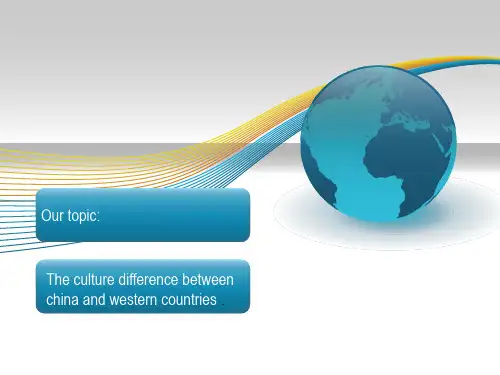
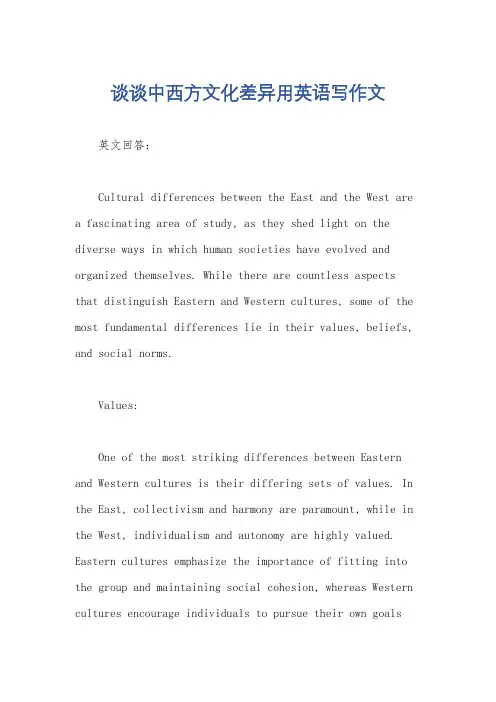
谈谈中西方文化差异用英语写作文英文回答:Cultural differences between the East and the West are a fascinating area of study, as they shed light on the diverse ways in which human societies have evolved and organized themselves. While there are countless aspects that distinguish Eastern and Western cultures, some of the most fundamental differences lie in their values, beliefs, and social norms.Values:One of the most striking differences between Eastern and Western cultures is their differing sets of values. In the East, collectivism and harmony are paramount, while in the West, individualism and autonomy are highly valued. Eastern cultures emphasize the importance of fitting into the group and maintaining social cohesion, whereas Western cultures encourage individuals to pursue their own goalsand desires.Beliefs:Another fundamental difference lies in the religious beliefs and spiritual practices that prevail in each region. Eastern cultures are heavily influenced by Easternreligions such as Buddhism, Confucianism, and Taoism, which emphasize concepts of karma, reincarnation, and the interconnectedness of all things. Western cultures, on the other hand, are rooted in the Judeo-Christian tradition, which places a strong emphasis on monotheism, personal salvation, and the separation between humans and God.Social Norms:The social norms and customs that shape daily life in Eastern and Western cultures also differ significantly. In the East, there is a strong emphasis on respect for authority, hierarchy, and tradition. Individuals are expected to conform to social expectations and avoidcausing shame to their family or community. In the West,social norms are more egalitarian, and individuals are encouraged to question authority and express their own viewpoints.Communication:Communication styles also vary between Eastern and Western cultures. In the East, communication tends to be indirect and implicit, with a focus on non-verbal cues and subtle hints. In the West, communication is often more direct and explicit, with a strong emphasis on clarity and efficiency.Time Perception:Another notable difference is in the way that Eastern and Western cultures perceive time. Eastern cultures tend to view time as cyclical and fluid, while Western cultures view it as linear and finite. This difference can manifest in various aspects of life, such as attitudes toward work, leisure, and personal relationships.These are just a few examples of the countless cultural differences that exist between the East and the West. These differences shape everything from the way that people interact with each other to the way that they view theworld around them. Recognizing and understanding these differences is crucial for fostering mutual respect and cooperation between cultures.中文回答:文化差异。
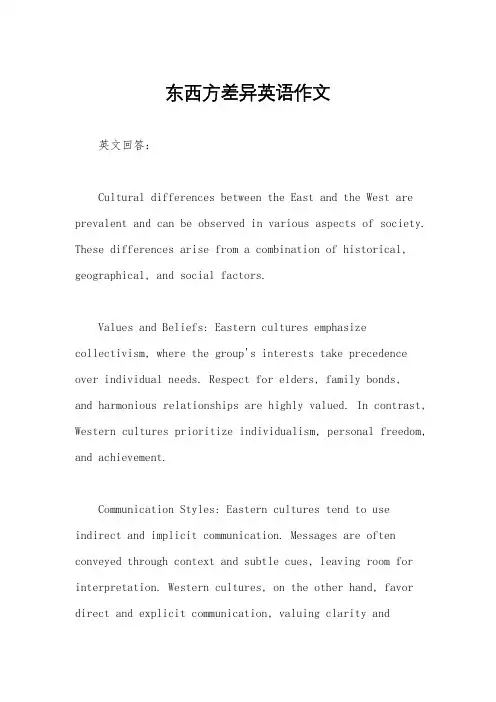
东西方差异英语作文英文回答:Cultural differences between the East and the West are prevalent and can be observed in various aspects of society. These differences arise from a combination of historical, geographical, and social factors.Values and Beliefs: Eastern cultures emphasize collectivism, where the group's interests take precedence over individual needs. Respect for elders, family bonds,and harmonious relationships are highly valued. In contrast, Western cultures prioritize individualism, personal freedom, and achievement.Communication Styles: Eastern cultures tend to use indirect and implicit communication. Messages are often conveyed through context and subtle cues, leaving room for interpretation. Western cultures, on the other hand, favor direct and explicit communication, valuing clarity andefficiency.Time Perception: Eastern cultures generally have a more cyclical and fluid view of time. Punctuality may not be as strictly adhered to as in Western cultures, which emphasize linear time and schedules.Education: Eastern education systems prioritize memorization, rote learning, and respect for authority. Western education, however, encourages critical thinking, creativity, and self-expression.Work Culture: Eastern workplaces often maintain a hierarchical structure, with workers adhering to specific roles and responsibilities. Harmony and cooperation are emphasized, and job security is highly valued. In Western workplaces, competition, individual performance, and innovation are typically given greater importance.Social Etiquette: In Eastern cultures, politeness,谦让(modesty), and restraint are highly regarded. Public displays of affection or strong emotions are generallyfrowned upon. Western cultures, on the other hand, are more expressive, with greater acceptance of emotional displays and personal space.Art and Aesthetics: Eastern art often emphasizes balance, symmetry, and the representation of nature. Western art, on the other hand, is characterized by a wider variety of styles, ranging from realism to abstract expressionism.Religion and Spirituality: Eastern religions, such as Buddhism and Hinduism, focus on inner peace, self-realization, and the interconnectedness of all things. Western religions, such as Christianity and Islam, emphasize faith, moral principles, and the existence of a transcendent deity.中文回答:东西方文化差异。
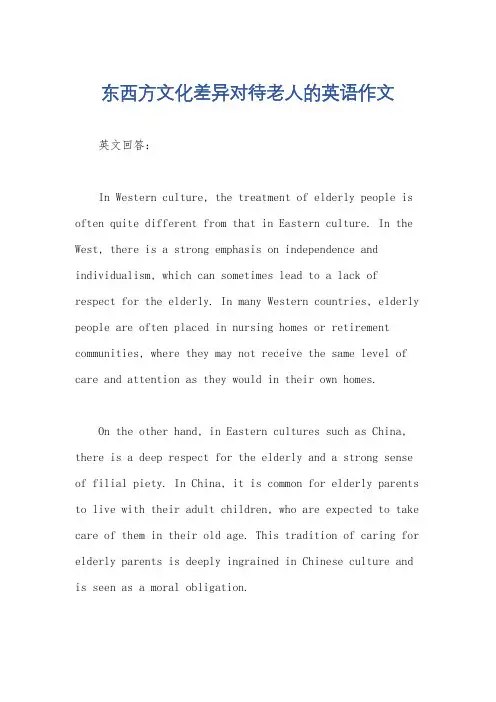
东西方文化差异对待老人的英语作文英文回答:In Western culture, the treatment of elderly people is often quite different from that in Eastern culture. In the West, there is a strong emphasis on independence and individualism, which can sometimes lead to a lack of respect for the elderly. In many Western countries, elderly people are often placed in nursing homes or retirement communities, where they may not receive the same level of care and attention as they would in their own homes.On the other hand, in Eastern cultures such as China, there is a deep respect for the elderly and a strong sense of filial piety. In China, it is common for elderly parents to live with their adult children, who are expected to take care of them in their old age. This tradition of caring for elderly parents is deeply ingrained in Chinese culture and is seen as a moral obligation.One example of this cultural difference can be seen in the way that elderly people are addressed. In Western countries, it is common to refer to elderly people by their first names or even by nicknames, which can be seen as a sign of familiarity and informality. In contrast, in China, it is considered respectful to address elderly people using formal titles such as "Grandpa" or "Grandma," even if they are not actually related to you.Overall, while there are certainly exceptions to these generalizations, the differences in the treatment ofelderly people between East and West highlight the broader cultural values and priorities of each society.中文回答:在西方文化中,对待老年人的方式通常与东方文化有很大的不同。
中外文化差异的英语作文带翻译篇一:中西方文化差异英语作文In my view, it is not surprising that Mr. Jones and Mr. Wang had a so unpleasant conversation, because it caused by the different culture between East and West.Modesty is one of the national characters of Chinese people, which can be proved by those stories about modesty in the history of China. When praised in public, the Chinese may deny it to show the modesty, though he is happy to hear that. However, the Westerner may just say “thank you”to express happiness.If I were Mr. Wang, I would say “Thank you for your praise, and I will keep working hard to do better”. As far as I am concerned, excessive modesty is just hubris, so we should receive the praise with happiness and do better.If I were the boss, I would study the different culture more to understand the staff. As the old saying goes, do in Rome as Rome does. So only if the boss know the difference in the culture and do the right things, can he motivate the staff more appropriately to make more money.篇二:中西文化差异比较(英文)The difference between chinese and western cultureWith the rapidly challging word, people throughout the world have found it increasingly necessary to minimize the rate of misunderstanding due to miscommunication in their contacts with another. In the oast most human beings were born, lived, and died within a limited geoographical area, never encountering people of other cultural backgrounds. It might be said that technological advances have been most effective in creating the borderless word, the global community. As our world shrinks and its inhabitants become interdependent, people from remot cultures increasingly come into contact on a daily basis. It is no longer hard to find situations in which membes of ince isolared groups of people. Now these people may live thousands of miles away or right next door to each other. So all the people are faced with the challenge of understand this world. So when the east meet west, there are many problems. Some problems are listed as follows.First of all, the way of eating. All huaman beings have certain basic needs. Our fundamental needs for things that keep us alive. This is the physioligical need. All individuals must eat in order to survive. But what people eat, when they eat, and the manners in which they eat are all patterned by culture. No society views everything in its environment that is edible and might providenurishment as food. Americans eat oysters but not snail. The French eat snails but not locusts. The Jews eat fish but not pork. The Hindus eat pork but not beef. The Russiand eat beef but not snake. We all have ideas about what kinds of food are good to eat. We also have ideas about what kinds of food are bad to eat. As a result, people from one culture often think the food that people from another culture eat are disgusting or nauseating. Dislike is not the only reason why some culture will not eat a certain food. In some clture, certain foods are taboo. Sometimes the food taboos may be so strong thrat just the thought of eating forbidden foods can cause an indivdual to feel ill. We can also find culture difference in way of bring up children treating the early, greeting each other, saying and spending money before other people do in everyday, but in some English-speaking countries, people do not agree with us. We chinese may enjoy something that is not usually consider as edible by the English-speaking people. Generally we perfer to have thing hot and much emphasis on the taste. We eat from one plate when we are eating with others, and we like to seat one by one, and in the shape of a round. On the opposite, some English-speaking contries, most of the people like to seat in two rows, two people face to face. They have their own plate. On the aspect of table manners, there are many differences between chinese and English-speaking people. Forexample, in some Englishi-speaking countries, Bread plates are to the left of the main plate, beverage glasses are to the right. Salad fork, knife and soup spoon are further from themain plate than the main course knife, fork and spoon. When eating bread rolls, break off a piece before buttering. Use the knife only to butter the bread, not to cut it. They should not start eating before your host does or instructs to do so. At larger meals, it is considered okay to start eating once others have been served. When finished, place the knife and fork together at five o’clock with the fork on the left. It is considered rude to answer the telephone at the table. If need to take an urgent call, excuse self and go outside. Try to eat all the food you are served. But in China, the table manners are different. Chinese traditionally eat rice from a small bowl held in the left hand. The rice bowl is raised to the mouth and the rice pushed into the mouth using the chopsticks. Some Chinese find it offensive to scoop rice from the bowl using a spoon. If rice is served on a plate, as is more common in the West, it is acceptable and more practical to eat it with a fork or spoon. The thumb must always be above the edge of the bowl. The host should always make sure the guests drinks are sufficiently full. One should not pour for ones self, but should offer to pour for a neighbor. When your drink is being poured, you should say "thank youand tapfingers on the table to show appreciation. When people wish to clink drinks together in the form of a cheer, it is important to observe that younger members should clink the edge of their drink below the edge of an elder to show respect.Secondly, the way of communication. Form birth to death, communication plays an integral part in our life. There are some language problems, including the different styles of using language such as direct, indirect; expansive, succinct; argumentative, conciliatory; instrumental, harmonnizing; and so on. These different styles can lead to wrong interpretations of intent and evaluation of insincerity, aggreeiveness, deviousness, or arrogance, among other. The misinterpretation nonverbal signs and symbols such as gestures, postures, and other body movements. It is a definite communication barrier. But it is possible to learn the meanings of these observable message,usually in informal rather ways. It is more difficult to understand the less obvious unspoken codes of the other cultures. Language, as the carrier of culture, is created during the process of human beings’productive labor and serves as the tool of communication to convey the message between people. However, it has been endowed with magic and power in particular language acts. As the old saying goes, troubles come out of the tongue. Superstitious people think that the language itself can bring aboutfortune or misfortune so that taboos to restrict the use of language are created. Anyone who violates them will get punishment, whereas those who faithfully obey the restrictions of language taboo will get protection. Furthermore, linguistic taboos change with the development of society .The paper firstly analyzes the evolution of linguistic taboo. It is indicated in the paper that linguistic taboo exists in almost every aspect of people’s life and is a universal social phenomenon in China and Britain. Both Chinese andEnglish cultures are in agreement about linguistic taboos such as pronunciation taboo, and vocabulary taboo. However, influenced by different cultural backgrounds, ideologies and the concepts of value, Chinese and English linguistic taboos also have differences, as is discussed in the paper from the aspects of taboo subjects, taboo numbers and names. At last, this paper puts forward two effective ways of avoiding taboo, that is, using euphemism and having a good knowledge of the taboo culture. And this discussion would help English learners improve their ability of cross-cultural communication and achieve better communicational effects. For example, During the feudal times, people were not equal to the rulers and were suppressed by their superiors. The distinction between the upper and the lower classes was also reflected in theevaluation of the language used by them respectively. The words of upper class used were considered good and elegant while those used by the lower class were regarded as vulgar and indecent and should be avoided in the speech of ladies and gentlemen. In modern society, as a result of the development of science and technology, many natural phenomena are no longer mysterious. Human beings not only constantly improve their abilities to exploit the world where they are living through their great wisdom and knowledge, but also make efforts to explore the extraterrestrial world. Science has much more say in today’s society. Thereby, the superstitious elements in linguistic taboos decrease while those reflecting spiritual civilization increase.In short, by comparison, we can find that both Chinese and English communication reflect people’s psychology for good will, for safety and fortune and pleasantness. The Chinese and English people restrict their words and deeds through taboos, trying to keep a harmonious relationship between human and nature, or between people and society. They are a reflection of people’s pursuit of freedom and equality.The most important, the different way of family structure, family values and family education. Family structure is the big difference between east and west, traditional chinese, amony manyother Asians, repect their elders and feel a deep sense of duty toward them. Children repay their parents` sacrifices by being successful and supporting them in old age. This is accepted as a natural part of life in China. In contrast, taking care of aged parents is often viewed as a tremendous burden in the English-speaking countries, where aging and family support are not honored highly. In some English-speaking countries are still extrmely family-oriented. They are dedicated to helping their children and will sacrifice(转自: 千叶帆文摘:中外文化差异的英语作文带翻译) greatly for their children to get an edcuation. In turn, the children are devoted to their parents, who often live nearby. Grown children who go away and leave the country for the economic reasons typically send large parts of their salary home to their parents and the rest of the family. Or in some Asia, any decisions or actions are done from family consideration, not individual desires. Peope`s behavior is judged on whether itbrings shame or pride to the family. The children are trained to rely on their families, to honor elderly people, and to fear foreigners. And many of them think that their actions in this life will influence their status in the next life.The way of family edcation is also the different. We all know the family education is the elementary education for children. Manyserious problems have appeared in our education system in recent years. Almost everyone has realized the importance of solving these problems and many people have presented a lot of valuable suggestions. There are many types of family education in the world and each of them shows distinctive features and is closely responsive to its culture. And American family education is the most famous one among them. There are great differences in the concepts of education, methods of education and results of education between East family education and West family education. In some English-speaking countries, parents’aims are to train their children to have the ability of adapting to environmental variety and the ability of living independently. Based on this concept, most American parents emphasize more to train their children’s ability of independence once they are born. They generally believe that children’s growth must rely on their own experiences, because they think that children should form a self-supporting will and the capacity to live independently since their childhood. And the capacity comes from the training in the early age. The so-called training contains many aspects, such as work, temper will, patience, the spirit of hard work, etc. However, the most fundamental training is the ability of adapting to hard conditions. Through the process of work, children will form thelabor sense, learn some work skills and form a habit of labor. Besides, children can learn how to overcome difficulties, temper their willpower, develop their talents and skills, rich their knowledge, and form a habit of hard work and thrifty by working in hard conditions. It is just in the unconsciously process that children will obtain the independent survivability and take the responsibilities for the society. Compared with some English-speaking countries, Chinese parents have a very different concept of children’s education. Some parents in China only care about whether the children have a promising future, a good job, a good life or not. Based on these expectations, the majority of parents feel that their responsibility for their children is to create as good conditions as possible they can so that the children will not worry about anything in the future. Chinese parents would like to provide everything what they can for their children in the process of children’s growth. In short, they would like to sacrifice anything if their children can live better with their help. Therefore, in the process of children’s growth, the most important thing the parents concerning is to developing their children’s intellect, except for caring children’s daily life. In order to make their children have a good performance in study, become outstanding, or even become a famous person in the future, they would not let children doanything except studying. As for the children’s independence, civic awareness and their ability adapting to thesociety in the future, they consider little or not at all. From these aspects we can find the obvious differences of family education between America and China.When we faced with those difference between West and East, we should give some advice to solve these problems. According to the three big difference that pointed, we should find some way to deal with these problems.We can study other languages and learn to expect in nonvwebal forms and other cultural aspects. We can train ourselves to meet intercultural encounters with more attention to situation details. We can use an investigative approach rather than stereotypes and preconceptions. We can gradually expose ourselves to differences so that they become less threatening. We can even learn to lower our tension level when needed to advoid triggering defensive reactions. The overall goal should be to achieve intercultural communication competence.So the ideal solution to reduce the problems are to share knowledge with others in communication. This is why it is easiest to communicate with other members of the same group. This is why people so often gather together socially with others who are verymuch like them. Since intercultural communication is communication with members of different cultual groups, and therefore, because we do not share knowledge, assumptions, values, and forms of discourse with them, we must expect there to be problems of interpretation. We must look for these problems, anticipate where they will arise out of our differences, and then plan our aommunications to be as effective as possible. However, we have to remember that, most of the time, the different ways that are the customs of dfferent cultures are neither right nor wrong. It is simply that different people do the same tings in different manners, even though we can not understand ,we should show the respect. I believe this is the best way to make our life become more comfortable and make the world more harmonious.篇三:英语作文-东西方文化差异-Cultural differencesCultural differencesThere are plenty of. people in the world. They come from different countried, have theirown race, belief and way of life. What is more, their culture is different from others'. So,there is no doubt that cultural difference exist among lots of countries, especially betweeneastern and western countries.Compared with the way of life, eastern people always have a bath in the evening or atnight in order to relax themselves after one-day's hard work while western people take abath in the morning. so as to keep freshly for the whole day. In general, it is true,especially for Chinese people. We, Chinese people would like to take baths at night ratherthan in the morning. It is a kind of habits we behave all the time.Compared with the relationships, differences are as follow: firstly, eastern people like tomake friends, sometimes through their friends, parents, relatives. While western peoplebehave a little shyly. They do not want to make friends all the time. Secondly, easternpeople would like to hang out with the person they do not know about quite a lot. whilewestern people just like going out with the person whom they get along well with.Finally, eastern people have much more friends than western people for their quitedifferent way of getting along with. their friends. There is no doubt that eastern peopleare more outgoing than western people, so I agree with these a lot.As for way of solving problems, eastern people always deal with things indirectly. Theypay much attention to many things around them, and always work for a long time to solvethe problem. However, western people just go straight the heart of the problem and solveit directly and efficiently. As far as I am concerned, this difference between eastern andwestern people is quite normal and correct. Eastern people, especially Chinese peoplecare about things around them a lot, they always want to satisfy everyone's need, so thatthey spend much more time to solve a problem than western people.As for way of thinking, people in eastern areas usually think indirectly. They used tothink about the things around them a lot and try to deal with things in a reasonable evenperfect way. However, in comparison with the eastern people,people in the western areasoften think directly. They pay less attention to the things around them and care muchmore about themselves. Honestly speaking, I disagree to this.In my opinion, everyone isspecial and has their right and obligations to do things. There is no need for us to critiseothers and what we should do is to respect their own. decision.There are a lot of differences between eastern and western culture. These are the symbolsof their own characteristics and we need time to dig out more differences so as to learnmore about them. Most importantly, we must respect their culture firstly!。
中西方节日文化差异英文作文Culture Differences of Chinese and Western Traditional FestivalAbstractTraditional festivals are the historical products of a nation’s development. Whether in China which has a long history of more than five thousand years or in the newborn America, the origination of traditional festivals in the two countries is similar. Most traditional festivals originated from people’s expectation for harvest in the agricultural production, the worship towards the gods and the nature, sacrifices to the historical characters and etc. After the long-term evolution, traditional festivals have become an indispensable part of the national culture. Through traditional festivals, the distinct cultural characteristics of a people and the national spirits can be observed. Since the ancient time, China has been a large agricultural country, the small-scale economic mode known as ―The men plough and the women weave‖ initiated the agricultural civilization of Chinesecharacteristics. Chinese traditional festivals are deeply rooted in the agricultural civilization and greatly influenced by Confucianism. To some extent, Chinese traditional festivals have relieved from the primitive taboos and tended to be happy festivals which reflect the concept of harmony and integration in Confucianism. In America, religion plays a very important role in people’s life. With various branches, the religious system of America is quite complicated, among which Christianity is of the greatest importance. Some American traditional festivals are the direct products of Christianity and most festivals have evolved into the religious festivals later. This paper is designed to discuss the differences in customs, origins and other aspects of traditional festivals with the similar cultural connotation, then analyze the reasons lying behind the differences and finally reflect the cultural differences of the two nations. The paper also analyzes the mutual fusion in tradtional holidays between China and the west.Key words: Traditional festivals; Chinese and American culture; cultural differences; causes; mutual fusion.中西方传统节日文化的差异摘要传统节日是一个民族发展的历史产物。